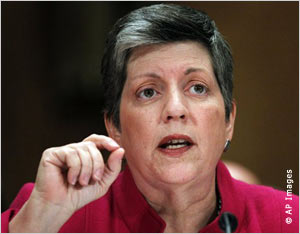
29 September 2010
Aviation Continues to Be Terrorist Target, U.S. Official Says

Washington — The United Nations aviation body says a ban on passengers carrying liquids on international flights may be lifted as soon as 2012, but U.S. Homeland Security Secretary Janet Napolitano says it’s too early to tell.
Napolitano said the announcement may be premature because the technology needed to ease restrictions on liquids is not yet ready. The U.S. security chief spoke September 28 in response to remarks from International Civil Aviation Organization Secretary-General Raymond Benjamin, who said the security equipment put in most airports should allow the ban to be lifted soon.
Napolitano spoke in Montreal, where she is participating in the ICAO assembly on global aviation standards. Meetings began September 28 and are set to last through October 8. More than 190 member countries sent delegations to the talks, which focus on aviation safety and security standards.
The United States is urging nations to sign a joint declaration to strengthen worldwide aviation security measures against terrorist threats. During the past nine months, similar declarations have been negotiated at regional security meetings in Europe, Africa, Asia, the Middle East and the Western Hemisphere.
The push to improve aviation safety standards follows a terrorist plot in 2006 in which alleged terrorists were planning to use liquid explosives to attack trans-Atlantic flights. A ban was placed on passengers boarding flights with liquids and gels. The European Union, though, has announced that it will phase out the liquids restrictions beginning in 2013.
What has also triggered additional aviation security measures was a threat from a powdered bomb after a failed plot to bomb a U.S. airliner on December 25, 2009. Federal authorities say Nigerian Umar Farouk Abdulmutallab tried to detonate a bomb hidden in his underwear during a flight from Amsterdam to Detroit.
Napolitano said enhanced security will better protect global aviation from such “evolving terrorist threats.” She is urging countries to use body scanners and other technology to detect both metallic and nonmetallic explosives, such as plastic and powdered bombs.
The United States has begun checking passenger names against flight watch lists, adding to air carriers’ checks. Napolitano said this is one of many measures recently adopted in the United States to increase flight safety.
She offered support for the ICAO’s strategy to establish future global aviation security standards.
(This is a product of the Bureau of International Information Programs, U.S. Department of State. Web site: http://www.america.gov)
